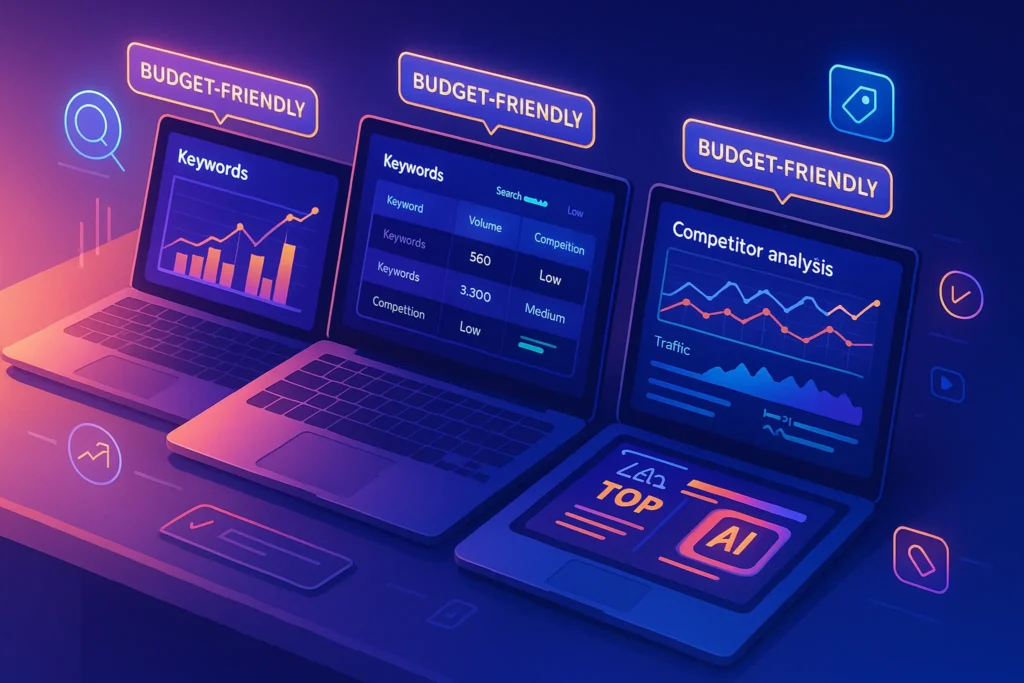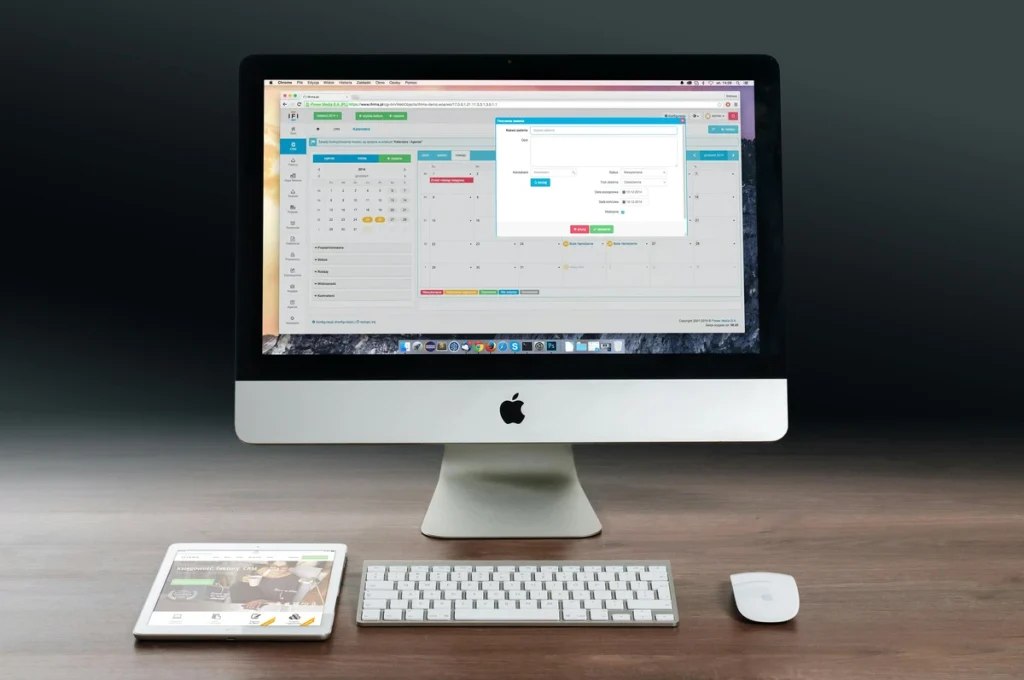Introduction:
In 2025, keyword tracking is still at the heart of any winning SEO strategy. Whether you’re a blogger, e-commerce owner, or digital marketer, knowing where your pages rank — and how those rankings change over time — directly impacts your content planning and ROI.
💬 But here’s the problem: premium SEO tools can cost upwards of $100–$200/month. That’s a steep price if you’re just starting out or running a lean marketing budget. The good news? You don’t need to spend big to get accurate keyword tracking.
In this guide, we’ll explore budget-friendly SEO tools that specialize in keyword tracking — tools that deliver reliable data, clear reports, and essential features without forcing you into enterprise pricing. You’ll also get practical tips on choosing the right plan, avoiding hidden costs, and integrating these tools into your workflow.
🧠 Why Keyword Tracking Still Matters in 2025
In 2025, keyword tracking remains essential because it provides the real-time visibility you need to measure the impact of your SEO efforts. While modern search focuses heavily on intent and topic authority, rankings are still the clearest indicator of whether your optimizations are moving the needle. Accurate tracking helps you spot quick wins, detect sudden drops before traffic loss escalates, and monitor competitor movement. Without it, you’re essentially flying blind — making decisions without data and risking missed opportunities that could have been leveraged into measurable traffic and revenue gains.
Some marketers have argued that keyword tracking is “less important” now that search intent and semantic SEO dominate. But the reality is — you can’t improve what you don’t measure.
✅ Measure progress: See exactly how your SEO changes impact rankings over days, weeks, and months.
✅ Spot opportunities: Identify keywords where you’re just outside the top 10 and can push higher with small tweaks.
✅ React quickly: Catch ranking drops before they become traffic disasters.
💡 If you’re mapping out your keyword strategy, pairing a good tracker with the techniques from our Ultimate Guide to Using ChatGPT for Keyword Research is a powerful combination — one finds the right keywords, the other tracks your progress with precision.
🛠 Choosing the Right Affordable Keyword Tracking Tool
Selecting the right budget-friendly keyword tracker means balancing accuracy, features, and cost. Focus on tools that deliver reliable daily updates, allow location-specific and device-based tracking, and include competitor analysis within their entry-level plans. Avoid being swayed solely by the lowest price — a slightly higher monthly fee can be worth it if it saves you hours in reporting or offers insights that free tools can’t match. Always start with a monthly subscription to test usability and data accuracy before committing annually, and consider how easily the tool integrates into your current SEO workflow for maximum ROI.
Before diving into our top picks, here’s what to look for in a budget-friendly keyword tracker:
-
Accuracy of data – If rankings are delayed or inaccurate, you can make bad decisions.
-
Update frequency – Daily updates are ideal for tracking changes and testing optimizations.
-
Location & device tracking – Essential if you target multiple regions or mobile searches.
-
Competitor comparison – See how you’re doing against the sites you care about.
-
Report flexibility – Custom, exportable reports save hours when sharing updates with clients or teams.
🧠 Nerd Tip: Avoid locking into long-term contracts before testing. Many of the tools below offer monthly plans, so you can switch if your needs change.
📬 Stay Ahead in SEO — Join the NerdChips Newsletter
Get weekly, no-fluff insights on SEO tools, keyword strategies, and growth hacks — actionable advice you can apply in under 10 minutes.
No spam. Just high-value ideas once a week. Unsubscribe anytime.
🎯 The Top Affordable SEO Tools for Keyword Tracking in 2025
Here are the best options that balance affordability with accuracy — ranked by value, not just lowest price.
1. SERPWatcher by Mangools
SERPWatcher offers a clean, intuitive interface that makes keyword tracking accessible even for beginners. Starting at around $29.90/month, it tracks up to 200 keywords on the entry plan with daily updates and clear performance metrics like SERP volatility. It’s part of the Mangools suite, so you also get access to KWFinder for keyword research and SERPChecker for competition analysis, making it a compact all-in-one option for small site owners who want accurate data without the complexity of enterprise tools.
Mangools has built a reputation for simplicity and clean UI — SERPWatcher is their dedicated keyword tracking tool.
Why it’s great for budgets:
-
Starts at $29.90/month (annual billing drops it to ~$19/month).
-
Tracks 200 keywords in the entry plan — plenty for a small site or local business.
-
Includes SERP volatility tracking to spot Google algorithm shifts.
💡 Bonus: Mangools includes access to KWFinder (keyword research) and SERPChecker (SERP analysis), making it a great all-in-one for beginners.
🔗 If you want to understand how modern tools like this evolved from the early days of SEO software, our Top SEO Tools and How They’ve Evolved post covers that history in depth.
2. AccuRanker
AccuRanker is renowned for its on-demand updates and ultra-fast data refresh, allowing you to instantly see ranking changes after publishing new content or making SEO adjustments. It’s priced competitively for small keyword volumes, starting at the equivalent of $9.70/month for 100 keywords (annual billing). Its robust filtering, competitor tracking, and SERP feature monitoring make it a go-to for agencies and solo SEOs who need enterprise-grade accuracy but don’t want to pay for unused extra features.
Known for blazing-fast updates and extreme accuracy, AccuRanker is one of the few premium-grade trackers with a flexible entry plan.
-
Starts at $116/year for 100 keywords (around $9.70/month).
-
Refreshes keyword positions on-demand — useful if you’ve just updated a page.
-
Detailed competitor and SERP feature tracking.
🧠 Ideal for: Agencies or SEOs who need speed + accuracy without paying for hundreds of unused features.
3. SE Ranking
SE Ranking is one of the best value-for-money keyword trackers thanks to its flexible update schedules and broad feature set. Starting at $39/month for 250 keywords, it allows you to choose daily, every-three-day, or weekly updates to control costs. Alongside rankings, you get access to site audits, backlink monitoring, and competitor analysis, making it a strong choice for marketers who want a versatile tool that handles multiple SEO tasks in one affordable package.
SE Ranking offers one of the best value-for-money tracking systems in the SEO world.
-
Starts at $39/month for 250 keywords (annual billing lowers cost).
-
Flexible update frequency (daily, every 3 days, or weekly — cheaper if less frequent).
-
Extras like website audit and backlink monitoring built in.
💬 If you’re following our SEO Content Writing: How to Rank in 2025 framework, SE Ranking gives you the data to confirm whether your on-page optimizations are working.
4. Wincher
Wincher focuses on simplicity and volume, giving you 500 keyword slots for $29/month — one of the highest keyword counts in its price range. It’s especially attractive for WordPress site owners thanks to its native plugin, which lets you check rankings right inside your WP dashboard. With daily updates, automated email reports, and a straightforward interface, Wincher is ideal for bloggers, niche site builders, and small businesses that want keyword tracking without unnecessary complexity.
Wincher is a lightweight, affordable tracker built specifically for WordPress users.
-
Starts at $29/month for 500 keywords.
-
Offers a native WordPress plugin for checking rankings inside your dashboard.
-
Simple daily ranking reports — perfect for site owners who want minimal complexity.
💡 Best for: Bloggers and small businesses that want keyword tracking without learning a complicated dashboard.
5. Nightwatch
Nightwatch combines affordability with advanced segmentation features, making it an excellent choice for local SEO campaigns. Starting at $39/month for 250 keywords, it allows hyper-specific tracking down to city or ZIP code level. Its visual reporting and customizable dashboards make it particularly appealing to marketers who want to present data to clients in a clear, branded format, while still keeping costs reasonable compared to higher-end enterprise platforms.
Nightwatch is lesser-known but delivers enterprise-level filtering and visualization at an affordable price.
-
Starts at $39/month for 250 keywords.
-
Excellent for local SEO — supports tracking in specific cities or ZIP codes.
-
Customizable reports with advanced filtering.
🧠 Why consider it: If local SEO is part of your strategy, accurate location-specific tracking is worth the investment.
🎨 Quick Comparison Table
| Tool | Starting Price | Keywords Tracked | Update Frequency | Best For |
|---|---|---|---|---|
| SERPWatcher | $29.90/mo | 200 | Daily | Beginners & all-in-one use |
| AccuRanker | $9.70/mo* | 100 | On-demand | Agencies needing speed |
| SE Ranking | $39/mo | 250 | Flexible | Balanced features & cost |
| Wincher | $29/mo | 500 | Daily | WordPress site owners |
| Nightwatch | $39/mo | 250 | Daily | Local SEO focus |
*Annual plan
🛠 How to Integrate Keyword Tracking Into Your SEO Workflow
Integrating keyword tracking effectively means making it a decision-making tool, not just a reporting habit. Set a regular review schedule (weekly or biweekly) to identify trends, focus on keywords sitting just outside the top 10 for quick wins, and monitor competitor movements on your highest-value terms. Pair ranking data with analytics tools to see how changes correlate with traffic and conversions, and use this insight to adjust content, link building, and on-page SEO. The goal is to turn raw ranking data into clear action steps that continuously improve your search performance.
Tracking rankings is only valuable if you actually use the data to make decisions. Here’s how to turn insights into action:
-
Weekly Review: Look for keywords moving up or down. Investigate reasons behind sudden changes.
-
Spot Quick Wins: Keywords ranked #11–15 often need only minor tweaks to break into the top 10.
-
Track SERP Features: See if you’re appearing in snippets, People Also Ask, or local packs.
-
Cross-check with Traffic: Combine ranking data with Google Analytics and Search Console for real performance insight.
💡 Pair your tracker with some of the Google Tools That Are Free But Insanely Useful to get a full SEO picture without paying for premium analytics.
🧠 Recommended Budget SEO Stack
💡 Build a cost-effective SEO toolkit that covers all bases:
-
-
SERPWatcher – clean, affordable keyword tracking for daily updates.
-
Ubersuggest – quick keyword ideas + basic audit.
-
Google Search Console – free performance tracking from the source.
-
💰 Pricing Strategy & ROI Calculation for Keyword Tracking Tools
To ensure your keyword tracker is truly affordable, compare its monthly cost against the value it generates. Estimate potential traffic gains from ranking improvements, multiply by your average conversion rate and customer value, and see if the projected return exceeds the tool’s price — ideally by a significant margin. Remember to account for compounding gains: a single top-3 ranking can deliver consistent traffic for months or years, making even a $30–$50/month investment highly profitable if it supports meaningful keyword growth.
An “affordable” tool is only truly affordable if it delivers more value than it costs. Here’s a quick ROI framework you can use:
-
Estimate potential traffic gain — Use historical data or your keyword research to project how ranking improvements could increase clicks.
-
Assign a value per visitor — If your average conversion rate is 2% and each conversion is worth $50, every 100 visits is roughly $100 in value.
-
Compare against tool cost — If a $30/month tracker helps you gain $300/month in traffic value, you’re getting a 10× return.
-
Factor in long-term wins — SEO gains often compound. A keyword you push to the top 3 can deliver steady traffic for years.
💡 This method makes it easier to justify even slightly higher-priced tools if they offer features that move the needle faster.
📌 Real-World Use Cases for Affordable Keyword Tracking
Understanding how others use keyword trackers can spark ideas for your own workflow:
-
Solo Blogger – Uses SERPWatcher’s entry plan to track 150 core keywords, focusing on pushing rankings from #12–#20 into the top 10.
-
Small Agency – Uses SE Ranking with a 500-keyword plan, splitting allocations between clients and delivering monthly branded reports.
-
Local Business Owner – Uses Nightwatch to track rankings in specific ZIP codes, monitoring both organic and local pack results.
-
E-commerce Store – Uses AccuRanker to refresh keywords on-demand during product launches and seasonal campaigns.
🧠 Pairing these scenarios with the strategies in AI-Powered Marketing: Top Tools Marketers Shouldn’t Miss can help you make the most of each ranking opportunity.
🎯 Tiered Recommendation Table – Budget to Premium
| Tier | Monthly Budget | Best Tool Pick | Why It Fits |
|---|---|---|---|
| Budget | Under $30 | Wincher | High keyword count, simple reports |
| Balanced | $30–$50 | SE Ranking | Flexible updates, extras like audits |
| Premium | $50–$80 | AccuRanker | On-demand refresh, agency-level accuracy |
💡 This tiered view helps you decide based on budget before diving into feature lists.
🛠 Integrating Paid Trackers With Free Tools for Maximum Value
You can stretch your SEO budget further by combining your paid keyword tracker with free Google tools:
-
Google Search Console: Shows actual queries driving clicks, which you can then add to your tracker for monitoring.
-
Google Trends: Helps you spot seasonal or trending keywords to track before they peak.
-
Google Analytics: Lets you tie ranking improvements directly to engagement and conversions.
💬 By using this stack, you minimize “tool creep” and still get a full, 360° SEO picture. For more free tool ideas, check out Google Tools That Are Free But Insanely Useful.
⚠️ Common Mistakes in Keyword Tracking
Even the best tool won’t help if you track the wrong way. Avoid these pitfalls:
-
Tracking too many low-value keywords: Focus on terms with real business impact, not just easy wins.
-
Obsessing over daily fluctuations: Search rankings naturally move a little each day — look at weekly or monthly trends for clarity.
-
Ignoring search intent shifts: A keyword’s SERP may change over time; adjust your content if Google starts favoring different formats.
🧠 Successful tracking is about insight, not obsession — let the data guide your next move, not your mood.
🔍 Tracking SERP Features for Extra Wins
Modern SERPs aren’t just blue links. Tools that track SERP features give you an edge:
-
Featured Snippets: Winning the snippet can double your click-through rate.
-
Local Packs: Critical for businesses targeting nearby customers.
-
People Also Ask Boxes: A chance to appear for related questions without separate rankings.
💡 Some budget tools track these features better than others — SE Ranking and Nightwatch are particularly strong here for the price.
🧠 Nerd Verdict
Keyword tracking is not about ego — it’s about data-driven decision-making. By using the right affordable tool, you get clarity without draining your marketing budget. Combine it with smart on-page optimization and content strategy, and you can outperform competitors paying 3–5× more for their software.
❓ FAQ: Nerds Ask, We Answer
💬 Would You Bite?
Which budget keyword tracker do you trust most? And if you’re using one not on this list, what made you choose it?
Share your pick — we may test it in our next roundup. 👇



